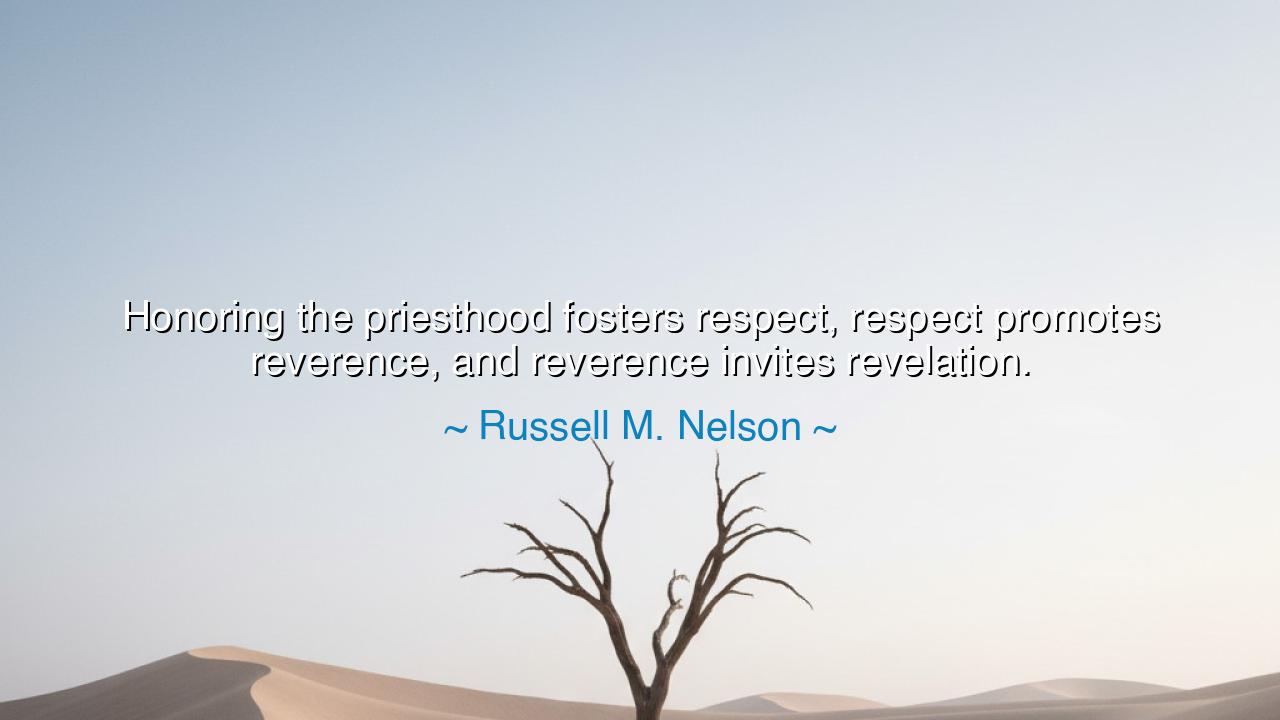
Honoring the priesthood fosters respect, respect promotes
Honoring the priesthood fosters respect, respect promotes reverence, and reverence invites revelation.






Hearken to the words of Russell M. Nelson, whose insight illuminates the sacred interplay between duty, respect, and spiritual awakening. He declares that honoring the priesthood fosters respect, respect promotes reverence, and reverence invites revelation. In these words lies an eternal principle: the cultivation of virtue begins with recognition of sacred authority, flows through disciplined regard for truth, and culminates in the illumination of understanding. Here is a pathway from human obedience to divine insight, one as old as civilization itself.
Since antiquity, the wise have taught that respect for those appointed as custodians of sacred knowledge sustains the moral and spiritual fabric of society. In ancient Israel, priests and Levites were revered not merely for their office, but because their service linked the people to higher truths. Nelson’s words echo this understanding: when the faithful honor those charged with spiritual stewardship, a cascade of virtue follows—respect begets reverence, and reverence opens the heart to revelation, the divine impartation of knowledge and wisdom.
Consider the story of King Solomon, who, when confronted with the challenge of governing his people wisely, sought counsel from the priesthood and adhered to sacred ordinances. In honoring these spiritual guides, Solomon cultivated respect among his people, and in that respect arose reverence—a humility before the divine order—which allowed him to receive wisdom that became legendary across the ages. This mirrors Nelson’s teaching: spiritual authority, when honored, channels insight that extends beyond human understanding.
Nelson’s observation also speaks to the importance of attitude. One may participate in ritual or office without true regard; yet respect and reverence are cultivated in the heart. They cannot be commanded but must be nurtured through acknowledgment of sacred roles and acknowledgment of truth greater than oneself. The seeker who honors the priesthood with sincerity finds their soul attuned to higher guidance, allowing revelation to enter as naturally as the dawn follows night.
History offers further illustration. In ancient Greece, the oracles of Delphi were revered as channels to divine insight. Citizens approached the priesthood with honor, understanding that their words and actions could summon wisdom otherwise inaccessible. In doing so, respect fostered reverence, and the reverent mind was poised to receive revelation, echoing Nelson’s chain of cause and effect: honor, respect, reverence, revelation—a progression both spiritual and practical.
The practical lesson emerges clearly: cultivate a spirit of honor toward those who bear responsibility for guiding, teaching, or safeguarding sacred truths. Respect their office, observe their counsel with humility, and allow reverence to dwell in the heart. In doing so, one prepares the mind and soul to receive insight that transcends ordinary perception, guidance that illuminates choice, morality, and understanding.
In daily life, this may manifest as attentiveness to spiritual leaders, patience with mentors, and engagement with sacred texts and practices. It also requires the avoidance of arrogance or dismissal, recognizing that honor and respect are the keys that unlock the door to revelation. By fostering this sequence, one harmonizes personal conduct with spiritual principle, creating a channel through which divine insight can flow.
Thus, heed the wisdom of Russell M. Nelson: honor those appointed as custodians of truth, cultivate respect in the heart, nurture reverence in the soul, and open oneself to the revelation that emerges from this sacred alignment. In this pattern lies a timeless pathway, bridging human devotion with divine guidance, illuminating the way from obedience to insight, and empowering generations to live wisely, morally, and with the clarity of spirit that only revelation can bestow.






AAdministratorAdministrator
Welcome, honored guests. Please leave a comment, we will respond soon